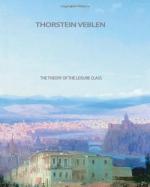
|
| Name: _________________________ | Period: ___________________ |
This test consists of 15 multiple choice questions and 5 short answer questions.
Multiple Choice Questions
1. How does Veblen describe the industrial classes' relationship with sports?
(a) As a form of warfare.
(b) As a passion.
(c) As an occasional diversion.
(d) As an addiction.
2. What is the state of the institution with regard to the present moment?
(a) It predicts how people will behave in the future.
(b) It transcends the present moment.
(c) It represents a snapshot of the present moment.
(d) It is never fully caught up to the present.
3. What aspect of man's character does gambling originate in, according to Veblen?
(a) The predatory character.
(b) The antepredatory character.
(c) The religious character.
(d) The peaceable character.
4. What does Veblen say fighting does for lower-class delinquents?
(a) Veblen says that it culls the weak.
(b) Veblen says that it settles property disputes.
(c) Veblen says that it asserts manhood.
(d) Veblen says that it threatens the upper classes.
5. What doctrine does education contribute to, in Veblen's opinion?
(a) The doctrine of laissez-faire government.
(b) The doctrine of peace through prosperity.
(c) The doctrine of pecuniary merit.
(d) The doctrine os nonaggression.
6. According to Veblen, what are sports based on?
(a) The compulsion to accept defeat.
(b) The ability to cause damage.
(c) The desire to impress women.
(d) The ability to settle things amicably.
7. What does Veblen say is the reason for gambling?
(a) Distrust in the economic system.
(b) Failure to be convinced of the value of labor.
(c) A belief in luck.
(d) Longing for riches.
8. Whose traits does Veblen say the leisure class propagates?
(a) The traits it generates out of itself.
(b) Its children's.
(c) Earlier cultures'.
(d) The Romans'.
9. How does Veblen say the clothing of worshipers differs from daily clothing?
(a) It is more devout.
(b) It is less comfortable.
(c) It is simpler.
(d) It is more ornate and expensive.
10. Where does Veblen say the leisure class lived during his time?
(a) Near the industrial community.
(b) Above the industrial community.
(c) Beyond the industrial community.
(d) Within the industrial community.
11. According to Veblen, women in the leisure class are partially exempt from what?
(a) Spiritual pressures.
(b) Cultural pressures.
(c) Pecuniary pressures.
(d) Familial pressures.
12. Which holiday does Veblen cite as an example of holidays being vicarious leisure?
(a) Christmas.
(b) Halloween.
(c) Easter.
(d) Labor Day.
13. What is affected by the institution of a social class?
(a) The character of the social structure.
(b) The means of production.
(c) The character of individuals.
(d) The economic model for society.
14. To what agency does Veblen attribute industrial man's faith in luck?
(a) God.
(b) Spirits of a place.
(c) The spirit of the times.
(d) The unseen hand.
15. Which stage of culture does the antepredatory variant correlate to?
(a) Primitive savages.
(b) The ancestors of the primitive savage stage.
(c) Settled agricultural savages.
(d) Early townsfolk.
Short Answer Questions
1. What happens as the lower classes are educated and depend on the leisure class?
2. What does Veblen cite as an example of gambling in organizations designed for devout observances?
3. What does Veblen say is the most serious occupation of the leisure class?
4. What force does Veblen say drives change in the leisure class?
5. What does Veblen say that the leisure-class and lower-class delinquents have in common, along with their belief in an unseen hand?
|
This section contains 565 words (approx. 2 pages at 300 words per page) |

|




